- Home
- Madeleine L'engle
The Young Unicorns Page 21
The Young Unicorns Read online
Page 21
Dr. Austin stared into the cold grate. “When Shasti and Shen-shu left here they knew that something was wrong, not only about Emily’s accident, but with the whole set-up at the lab.”
The Rabbi struck one note softly three times on the piano. “Did they tell you that?”
“Not before I came. It was all in the letter my wife referred to that came today. They didn’t tell me before because their suspicions were so incredible that, as scientists, they could only doubt the evidence that seemed to be piling up. They wanted to see if I, too, found something rotten in the state of Denmark.”
“Denmark!” Suzy exclaimed.
“It’s from Hamlet,” her mother explained quickly. “Did you?”
“Yes. I did. I began to smell something I didn’t like at all.”
“What?”
“And when?” Rabbi Levy closed the piano keyboard to keep himself from hitting the keys; the nervous sound might help him but could only distract the others.
“After we’d been here about a month. After I’d learned that Emily had been attacked in my office. After I began to dislike my superior.”
“Dr. Hyde?” Suzy asked.
“Yes.”
“But I thought you thought he was so wonderful, Daddy, the way he arranged for Emily’s lessons and was such a brilliant surgeon and all.”
“All that is true, Suzy, and I was certainly both impressed and blinded by it at first.”
“But the good doctor is too good, perhaps?” The Rabbi asked.
“Yes. I began to get tired of his moral platitudes. All autumn he has become more fulsome, more eloquent, with his talk of the redemption of the city. And then, not long ago, he came to me with a wild story that it is going around that I am the one responsible for Emily’s blindness.”
“You!” his wife exclaimed. “But we weren’t even here! We were in Thornhill.”
“As it happens,” the Doctor said, “I was in New York that day for a medical meeting. But it was a quick trip. I had a very ill patient in the hospital and so I didn’t stay overnight. I didn’t even take time for a phone call to Shasti and Shen-shu. But the story is that I came here, that I went through their desk, that Emily came in, that I grabbed a Micro-Ray that was not yet controlled, and directed it at her, intending only to have the flash blind her temporarily so that she wouldn’t see who it was, but—”
“Daddy!” Suzy rushed at him and flung her arms around him.
He held her. “It’s close enough to the truth to be frightening, Suzy. That’s evidently what did happen. Someone, not I, but someone, must have blinded Emily just that way.”
“I hate Dr. Hyde!” Suzy shouted. “I hate him!”
“Hush, Suzy. That won’t help.” He disengaged her gently, turned to the old man. “Remember, Rabbi Levy, I am a doctor. I must often make decisions not only for myself and my family, but for my patients.”
“Medical decisions?”
“What is one? To make an isolated medical decision isn’t as easy as all that, except perhaps in the operating theatre, where one has to decide, for instance, if indeed an organ is diseased enough to warrant its radical removal. This is the surgeon’s problem. The patient, and the patient’s family, lack the training that would give them the ability to make the choice. But otherwise? It’s a fine line. Human beings don’t divide into three separate and isolated entities, body, mind, and spirit.”
“I don’t understand. You sound like Grandfather,” Suzy said.
“Your grandfather has taught me a great deal.”
“What’s this got to do with that terrible Hyde?” Mrs. Austin asked.
“Hyde pays no attention to the fine line between guiding his patients towards wholeness, and manipulating. As you know, I cannot stand a wishy-washy doctor. But I don’t accept fascism, and Hyde is a fascist.”
“But things have gone beyond mere theory, haven’t they?” the Rabbi probed.
“There have been more brain operations than necessary. Hyde’s playing with the Micro-Ray the way Suzy used to operate on her dolls when she was little.”
“This is a grave accusation. Are you sure?” The Rabbi stood looking at the heavy piles of Braille music on the piano.
“A young boy about Dave’s age came into the hospital for an appendectomy. Dr. Hyde also happened, luckily, to find a tumor in the brain, which he removed with the Micro-Ray. I accepted this the first time, even the second and the third. But this kind of thing is happening too often.”
“So,” the Rabbi suggested, “you wrote to Shasti and Shen-shu?”
“Right. And went over all our old correspondence while I was waiting for an answer. And now that I was looking, it seemed to me that I could see veiled warnings, that they had been giving me hints all along which I had blindly ignored.”
“Daddy,” Suzy asked, “what’s this about Dr. Gregory going to Liverpool?” She had pulled herself together perhaps better than the adults. “I thought he went to Athens for somebody’s birthday party.”
“He did. That was his legitimate excuse. But right after the party he flew to Liverpool. He’s not as lost in the past as he sometimes seems, and he cares very much about his ewe lamb, though he has odd ways of showing it.”
“But what did he go to Liverpool for?”
“To see Shasti and Shen-shu. He’d begun to get his own suspicions, not of me, thank God. At first he was too upset over what had happened to Emily, and too grateful to Dr. Hyde for taking care of all the practical things which he knew himself to be too vague and uninformed to handle, to be able to see anything else. But before Shasti and Shen-shu left, they had a talk with him. They took upon their own shoulders a great deal of the responsibility for Emily’s blindness. They told him that they would not rest until they found out who had gone through their desk, and who had attacked Emily. From that moment on, Dr. Gregory made this his business, too. But he works slowly, methodically. He doesn’t go off half-cocked.”
“Daddy, what’s he going to do when he comes home tonight and finds Emily gone?”
Dr. Austin looked at his watch. He did not answer.
“And what about Canon Tallis? Where does he come in?”
“He’s an old friend of the Dean of the Cathedral’s, and he knew Shasti and Shen-shu years ago when they were working together in India. And evidently Tallis has a reputation for being able to solve problems of international skullduggery. I know he broke up some kind of a power ring centered in Portugal. So he was asked to come over here and find out what’s going on.”
“Why now?” the Rabbi asked. “Why at this particular moment in time?”
“Because everybody seemed to feel that things were converging, coming to a climax, that there was going to be some kind of crisis.”
The doorbell rang, sharply, Emily’s fugue. Then they heard a key in the lock.
The Bishop sat on his subterranean throne.
His golden mitre was brilliant in the floodlight. The tarnished lamp which Rob had said looked like a gravy boat lay in his lap. Behind him the ornate tile of the old subway station reflected a distortion of the throne, the red-carpeted steps. He was flanked on either side by a group of leather-jacketed youths, some with the Bat emblem on their sleeves. They had been assembling for the past hour, while the Bishop sat with Rob beside him on the throne and recited to him:
“In Xanadu did Kubla Khan
A stately pleasure-dome decree;
Where Alph, the sacred river, ran
Through caverns measureless to man,
Down to a sunless sea …
“You must stop being afraid, Robert. You must stop being afraid of me.”
Rob’s voice came thin and high. “I want to get down.”
The Bishop’s vulture’s talon held the rigid little body. “Now listen to me, little hostage. I will recite to you from Doctor Faustus.”
Rob stiffened, tried to jerk away. The Bishop did not loosen his grasp.
“I will recite to you from Coriolanus.”
�
�No. I don’t want to hear. I want to go home.”
One of the leather-jacketed boys called, “Let him have a piece of sermon, Bishop. Talk to him about freedom. Give him that bit.”
The Bishop dropped his voice from its dramatic, mesmerizing level (had he been trying to hypnotize Rob?), spoke almost conversationally, partly to Rob, partly to the phalanx of youths flanking him. “People don’t want freedom. Don’t you realize that? Can you not tell? People want security, safety. Freedom is too dangerous. You don’t want freedom, Robert. Hold still. What do you want now except to go back to the safety of your family? My friends here beside me, my young trusty followers, have found something better than freedom, have you not, my lads?”
“Right, Bishop,” they answered in unison.
“Now hear this: young people today in applying for jobs are not looking for challenge. This is common, statistical knowledge. Right, my lads?”
“Right, Bishop.”
“What the young man or woman applying for a job today is looking for is—”
“The lamp,” someone said, and was noisily shushed.
The Bishop continued,
“—is fringe benefits—”
“Right, Bishop.”
“A secure retirement policy—”
“Right, Bishop!”
“Adequate, nay more than adequate hospital and medical insurance—”
“Right, Bishop!”
“And the lamp,” someone called out, and was again hushed. There was an uneasy shuffling of feet.
“And what happens when people are offered freedom?” The Bishop overrode the interruption and answered his own question. “They will kill whoever offers it. What happened to the only so-called free man who has ever walked the earth? We crucified him. And”—his voice dropped so that all the leather-jacketed youths had to lean closer to hear—“I have come to the conclusion that this was the only thing to do, nay, that this was the right thing to do. Right, boys?”
“Right, Bishop!”
“Man is not capable of freedom. If we are given freedom we will destroy ourselves. Has this not been proven to us often enough? The only way we can be freed from the slavery of freedom is by relinquishing freedom, as you have done, boys, in a reasonable and pleasurable way. Right, boys?”
“Right, Bishop!”
“I, I am offering you the alternative to freedom; I am offering you the ultimate freedom! I am offering the redemption of the city, and then the redemption of the world. All this is in my power. Right, boys?”
“Right, Bishop!”
“And I now offer it to you. Offer me your freedom, and I will free you from its dangers.”
Dave and Emily, emerging from the tunnel with their three captors, heard these words.
—He’s mad! Dave thought.
Rob struggled wildly to get loose from the Bishop’s grasp. “Dave! Emily! Help me!”
Behind the Bishop a group of boys began to stamp softly, rhythmically. “The lamp, the lamp, we want the lamp.” “A flight, a flight, the Bats want to fly.”
The Bishop raised his thin hand for silence, speaking in his most authoritative voice. “Not yet, my lads! Patience! Your time will come! First we must offer the lamp to Robert and Emily and of course Davidson.” His eyes sparkled feverishly in the brilliant floodlights. The dark cables were coiled about the platform, near the steps to the throne, like heaps of sleeping serpents.
Emily and Dave stood side by side, Emily’s hand resting on Dave’s arm, absorbing his tension. She listened, scowling, trying to hear what kind of a place they were in. She had remained, despite her fear, aware enough during the trip through the tunnel both to listen and to smell, and to command every muscle in her body to remember the circuitous route. When Dave had tried to whisper to her where they were being taken, she had filed his words away, undigested, so that they would not interrupt the discipline of her concentration. She had smelled for herself the stench of subway, and now she pulled Dave’s words out of her subconscious, and into her mind’s eye flashed a reasonably accurate picture of the unused subway station. She knew that the passage from which they had emerged was still behind her. She could tell from the echoes that the platform ended at her right, that beyond were tracks which ran into tunnels at either extreme of the subway platform, that the wall of the platform was to her left, that there were many bodies near the wall absorbing the echoes that would have helped her to judge sizes and distances more accurately.
She heard Dave’s voice demanding, “What do you want?”
She heard Bishop Fall’s voice in reply, “I want Austin’s papers and I mean to get them.”
Twenty
Dean de Henares stood in the ambulatory and realized that his Cathedral was not on fire. Cyprian, who had come in with him, whined. The Dean moved slowly from chapel to chapel, leaving a small trail of blood behind him, though he was not aware of this, seeing the candles lit on each altar, St. James, St. Ambrose, St. Martin of Tours, St. Saviour, St. Ansgar, the saints after which the school lavatories had irrevently been named and whom the Dean loved as his own family. He stood outside St. Ansgar’s chapel, under an enormous crystal chandelier that glittered from the tiny light of the candles, and heard the broken side door by St. James open and slam shut. Cyprian, who had never before been allowed inside the Cathedral proper, barked.
“Tom!” the Dean called.
“Here!” the Canon called back. “What’s up?”
Their voices echoed throughout the Cathedral.
“Wait!” The Dean made his way back around the ambulatory to where Tallis stood outside St. James chapel. “Somebody’s lit the candles on all the chapel altars. And the lock to the St. James door is broken. There’s a bent key still in it.”
“Yes. I saw that. Do you have any idea what it’s about?”
“Not the faintest.”
“Mind your arm,” Tallis said. “You’re bleeding.”
Now the Dean noticed the blood. “It’s just a flesh wound. Can you tie it up for me? We’ll find some linen in the sacristy.”
“I could do a temporary job. But you’d better get to the hospital.”
“Later,” the Dean said, and started towards the sacristy. “Tom, who could have lit these candles, and why?”
It was Vicky, closely followed by Mr. Theo, who had rung the Gregorys’ bell, opened the door.
“We’ve got to go back to the Cathedral,” she kept saying excitedly, while Mr. Theo demanded explanations.
She tried to tell everybody exactly what had happened, but she was so close to hysteria that her father had to keep stopping her, questioning, making her go back. “And then I lit all the candles in all the chapels as a signal for Canon Tallis. We’ve got to go back to the Cathedral, Daddy! Emily and Dave are there somewhere, and Rob must be there, too, and we’ve got to go back to the Cathedral before anything else happens.”
“Stay here, all of you,” Dr. Austin said. “I’ll go.”
“No, Daddy! We’ve got to stay together, all of us! We’ve all got to go!”
For once Suzy was entirely on her elder sister’s side. “Write a note to Dr. Gregory telling him where we are, Daddy. We’ve got to go, Vicky’s right, and with Rochester. We’ve got to give Rochester something of Rob’s and Emily’s to smell, and something of Dave’s if we can find it, and Rochester will take us to them.”
“You’d never find them by yourself, Daddy!” Vicky cried. “The Cathedral’s too huge! Suzy’s right. Rochester’s the only one who can tell us where to go.”
Mrs. Austin said, “You can’t leave us again. I agree with the children. Let’s all go to the Cathedral together. I’ll get some things for Rochester to smell.”
Dr. Austin did not argue, but sat down by the telephone to write a brief note to Dr. Gregory. Mr. Theo kept sputtering because he was kept in the dark, no one ever told him anything, while Rabbi Levy tried to silence him long enough to explain.
Mrs. Austin brought a single scarlet mitten of Rob’s that had fallen by
his overshoes, and Emily’s navy and red school scarf dangling from its peg. Dave had few possessions and these he did not leave around; she could find nothing of his to give to Mr. Rochester for its scent.
“Never mind,” Dr. Austin said impatiently. “If he can lead us to Rob and Emily, Dave’s bound to be there, too.” He put the note on the mantelpiece, snapped Mr. Rochester’s leash onto the choke collar.
The big dog pulled to get up the street so that Dr. Austin had a hard time holding him back. Mr. Theo and the Rabbi could not walk as quickly as the others, and the dog, straining to go, grunting in unhappiness at being restrained, and then choking as he pulled the chain tight, expressed the impatience of them all.
Vicky, who had been so determined that they stick together at all costs, kept waiting for one of the old men to say, “Go ahead. We’ll catch up with you.” But neither of them spoke.
Dr. Austin drew Rochester up, sharply, so that the beast dropped to his haunches. “Mr. Theo, Rabbi Levy, you’re both pushing too fast. Five minutes one way or the other at this point isn’t worth a heart attack. Stand still and catch your breaths and then we’ll walk more slowly.”
Now Rabbi Levy did say, “Go ahead, Doctor. We’ll follow.”
But the Doctor spoke firmly. “No. If there’s danger it’s better if we all stay together.”
They moved, more slowly now, up the street.
Suzy whispered to her sister, “People are staring at us.”
Vicky realized that they were indeed drawing curious glances from the passers-by. She looked around rather wildly, then realized what an odd procession they made, led by the enormous dog grunting and straining at his leash, and brought up by the two old men: the Rabbi in his long dark coat that reached almost to the ground, his beard blowing wildly, his wide-brimmed hat on his head; Mr. Theo with his lion’s mop of yellowed locks blowing, limping along beside the Rabbi and wincing because of his arthritic knees. Even by the liberal standards of upper Broadway they were an unusual sight. “Look at us!” she whispered back. “Wouldn’t you stare, too?”

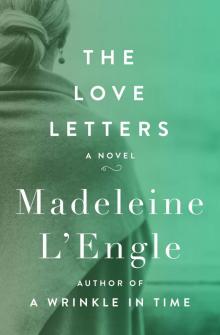 Love Letters
Love Letters The Summer of the Great-Grandmother
The Summer of the Great-Grandmother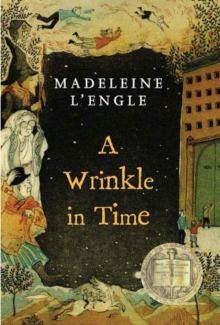 A Wrinkle in Time
A Wrinkle in Time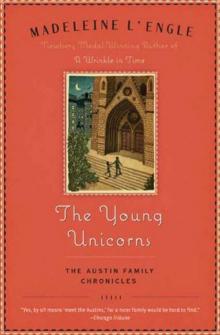 The Young Unicorns
The Young Unicorns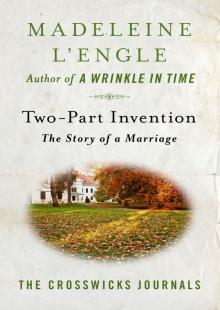 Two-Part Invention: The Story of a Marriage
Two-Part Invention: The Story of a Marriage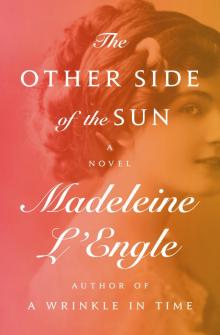 The Other Side of the Sun
The Other Side of the Sun A House Like a Lotus
A House Like a Lotus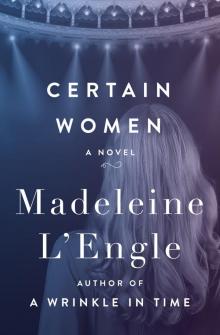 Certain Women
Certain Women Many Waters
Many Waters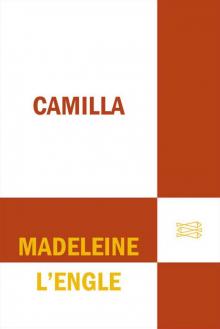 Camilla
Camilla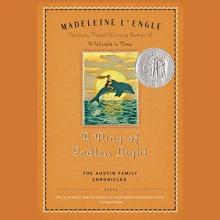 A Ring of Endless Light
A Ring of Endless Light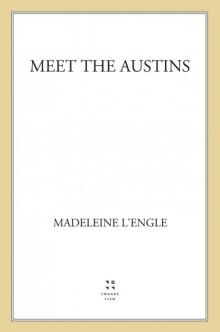 Meet the Austins
Meet the Austins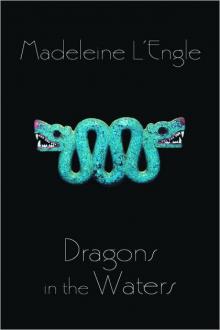 Dragons in the Waters
Dragons in the Waters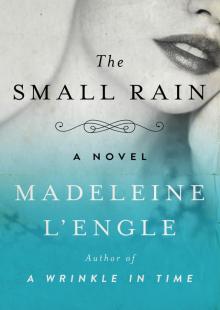 The Small Rain
The Small Rain The Moment of Tenderness
The Moment of Tenderness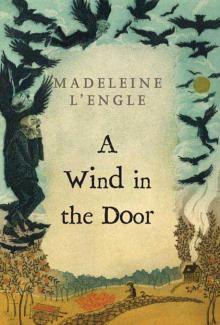 A Wind in the Door
A Wind in the Door Miracle on 10th Street
Miracle on 10th Street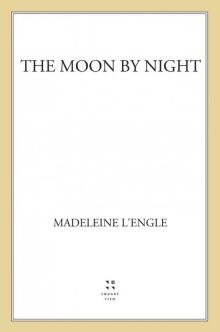 The Moon by Night
The Moon by Night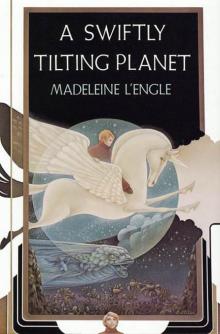 A Swiftly Tilting Planet
A Swiftly Tilting Planet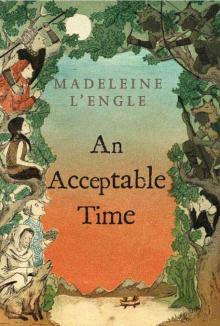 An Acceptable Time
An Acceptable Time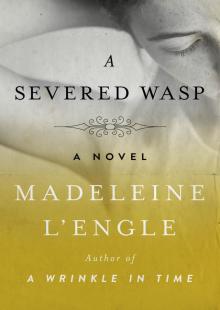 A Severed Wasp
A Severed Wasp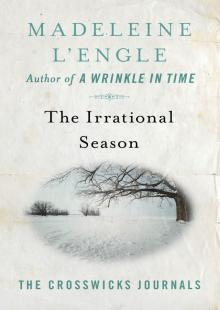 The Irrational Season
The Irrational Season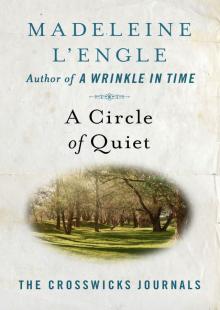 A Circle of Quiet
A Circle of Quiet A Live Coal in the Sea
A Live Coal in the Sea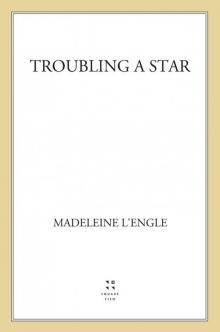 Troubling a Star
Troubling a Star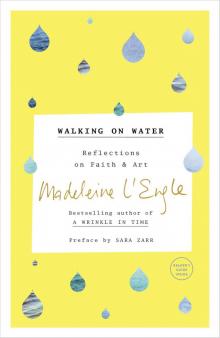 Walking on Water: Reflections on Faith and Art
Walking on Water: Reflections on Faith and Art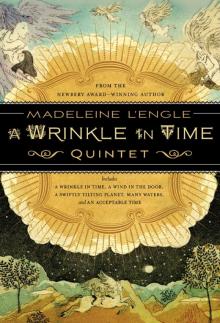 A Wrinkle in Time Quintet
A Wrinkle in Time Quintet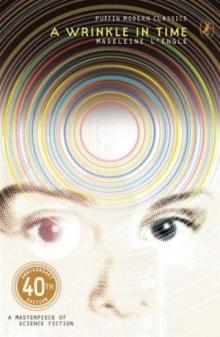 Wrinkle in Time
Wrinkle in Time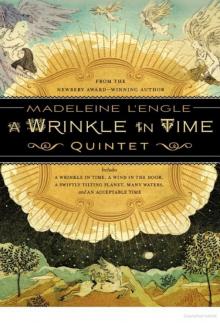 The Wrinkle in Time Quintet
The Wrinkle in Time Quintet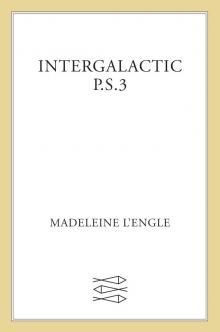 Intergalactic P.S. 3
Intergalactic P.S. 3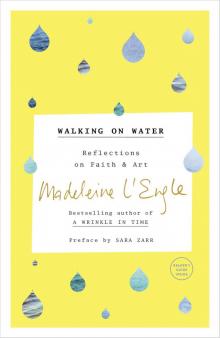 Walking on Water
Walking on Water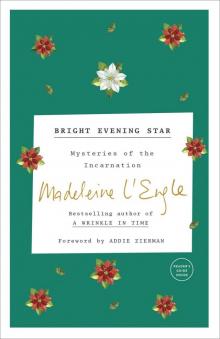 Bright Evening Star
Bright Evening Star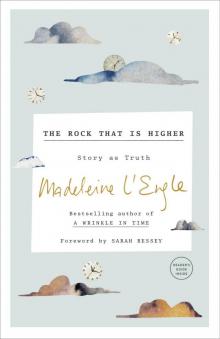 The Rock That Is Higher
The Rock That Is Higher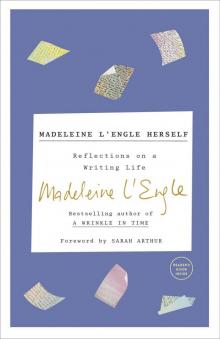 Madeleine L'Engle Herself
Madeleine L'Engle Herself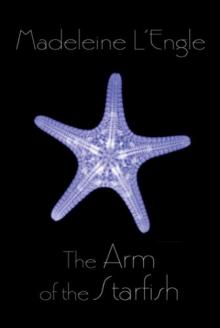 The Arm of the Starfish
The Arm of the Starfish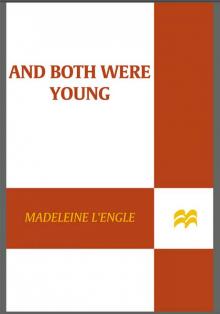 And Both Were Young
And Both Were Young The Twenty-four Days Before Christmas
The Twenty-four Days Before Christmas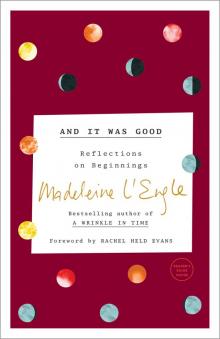 And It Was Good
And It Was Good A Stone for a Pillow
A Stone for a Pillow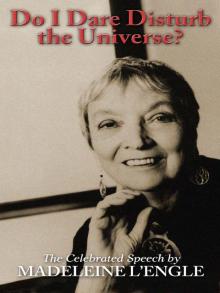 Do I Dare Disturb the Universe?
Do I Dare Disturb the Universe?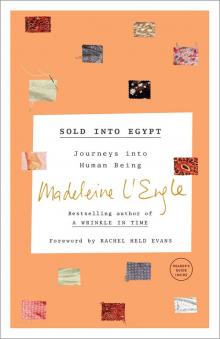 Sold into Egypt
Sold into Egypt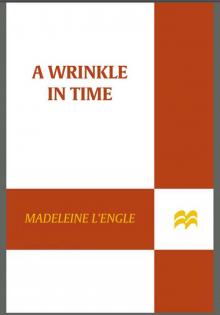 A Wrinkle in Time (Madeleine L'Engle's Time Quintet)
A Wrinkle in Time (Madeleine L'Engle's Time Quintet)